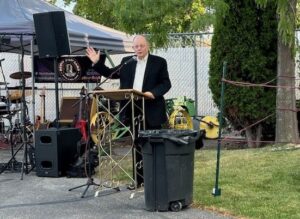Note: The following e-newsletter was sent to Sen. Padden’s subscribers September 19, 2024. To subscribe to Sen. Padden’s newsletter, click here.
Dear friends and neighbors,
Public safety relies on key factors, including having a sufficient number of law-enforcement officers to apprehend suspects and a legal system that includes enough attorneys for both the prosecution and the defense.
There is an emerging issue that would seriously jeopardize public safety in Washington.
On September 8, the Spokesman-Review published my op-ed piece that outlines why the state’s plan to reduce the workloads of public defenders has serious problems. Here is most of that piece:
Washington continues to rank 51st in the nation for the ratio of law-enforcement officers to residents – a sorry statistic that is finally attracting attention outside the state Capitol because of this year’s gubernatorial election.
Then there’s the other acute but less-publicized shortage in our criminal-justice system: the lack of public defenders and prosecutors.
Spokane County, for instance, is short nine prosecutors. And this past month, the city of SeaTac’s inability to find public defenders contributed to the dismissal of charges against 46 protesters arrested in April for blocking access to Washington’s largest airport.
The reasons for the attrition and the inability to recruit in the public-defense and prosecutorial sectors are simple: too many cases and too little compensation.
The public isn’t safer when people suspected of crimes are set free because a local jurisdiction can’t find a public defender for an indigent defendant, and dismisses the case to avoid violating that defendant’s Sixth Amendment guarantee of a speedy and public trial.
Nor are our communities safer when someone pleads guilty to a lesser charge and receives a lighter penalty because a public defender is too overworked to take the case to trial.
Also, neither situation gives law-enforcement officers or victims reason to have faith in our justice system.
To address what it views as the causes of this crisis, the Washington State Bar Association has forwarded a set of revised standards for indigent-defense services to our state Supreme Court.
The changes focus on new support-staff requirements for public-defense agencies, phased-in modifications aimed at helping attorneys gain trial experience, and workload adjustments to give public defenders more preparation time.
The Supreme Court is accepting public comments on these recommendations through Oct. 31. It also will hold two public hearings on this issue, with the first hearing on Sept. 25.
The state bar’s proposals are ambitious. However, as county and city attorneys told the Senate Law and Justice Committee at a recent meeting, accommodating the new standards would require considerably more funding.
My biggest concern is that until the pressure on local public defenders is eased, we’ll see more dismissals similar to what happened in SeaTac.
A Superior Court judge for whom I have much regard has shared a more specific worry: If the Supreme Court adopts the state bar’s recommendations but counties can’t increase or adjust their budgets to support the new standards, crimes like auto theft and burglary will be a lower priority and likely go unprosecuted.
Knowing all it took to allow officers to resume pursuing and arresting suspected car thieves, that would be unthinkable.
While the Supreme Court and the state bar deserve credit for their work to address this crisis, the best solutions tend to come from getting all stakeholders together. On this issue, the list should include not only legislators, local governments, and the legal community, but also our state’s law schools. Law enforcement supports my stance on this issue.
Many new lawyers are burdened with enormous amounts of student debt. Some sort of loan-forgiveness approach could help offset the lower compensation of public-sector attorney positions.
The law schools and bar association also could collaborate to send a message I heard as a law student: The best path to becoming a top-flight (and highly paid) litigator is to get courtroom experience, which is most readily accomplished by serving as a prosecutor or a public defender.
The work of prosecutors and public defenders is essential to the fair delivery of justice. There was a time when such positions also were viewed as both honorable and rewarding. We should strive to make them so again.
Grant County Courthouse in Ephrata. There is a shortage of prosecuting attorneys and public defenders in many central Washington counties.
Just a few days after the Spokesman-Review published my guest editorial, a joint op-ed piece, written by Melinda Young (the Chief Criminal Judge for King County Superior Court) and Sean P. O’Donnell, (who has served as Chief Family Law and Chief Criminal Judge for King County Superior Court), was published in The Seattle Times. This excellent piece predicted the plan to cut the state’s public offender caseload would have “profound consequences.” It offers several good arguments why this plan is flawed.
The text of their op-ed is below:
A crisis in public defense has pushed Washington’s justice system to a tipping point. The proposed fix will reduce public defense attorneys’ felony caseloads by almost 70% and misdemeanor caseloads by 60%. Washington is not prepared.
There is no plan to hire the new lawyers that will be needed or to deal with the resulting shortfall in legal representation for people accused of crimes. A substantial caseload reduction without a strategy will lead to unacceptable consequences for public safety.
Public defenders have repeatedly called out the job’s demands: too many cases, high stress and low pay. Their concerns are understandable. The job has great civic importance but is undervalued. Current caseload standards are outdated and do not account for the complexities of today’s criminal cases with video, DNA and social media evidence.
In response, the Washington State Bar Association has recommended an unprecedented reduction in public defenders’ caseloads by 2027.
The state Supreme Court seems poised to adopt the WSBA’s proposal.
The relief looks appealing, but its implications are profound.
The Constitution guarantees an indigent criminal defendant a right to a lawyer at no cost. Criminal cases cannot move forward without a public defender.
Crime rates will not drop to accommodate public defenders’ lower caseloads. Instead, the result from this capacity gap will mean fewer crimes are prosecuted and cases are dismissed.
Crime victims will be left to deal with this fallout.
The public defense crisis has already begun. There currently are not enough public defenders in Washington’s rural areas. In one Eastern Washington case, a judge ordered an accused rapist released because there was no lawyer. In Yakima, some defendants are not being arraigned on charges because of the public defender shortage. This is before any proposed caseload reduction.
Oregon is Exhibit A for failed planning. Its criminal justice system is in disarray because of a self-inflicted public defender capacity shortage. Defendants without assigned lawyers have been released from custody. There are significant delays resolving cases. Oregon’s legislature has addressed this debacle with millions in new spending. The situation has yet to improve.
Hiring more public defenders is a logical response, but it is more difficult than it sounds. Too few lawyers choose a career in public service. Counties and cities face budget shortfalls across Washington. Reducing caseloads does not mean more lawyers will become public defenders or that local governments have funds to hire them.
Here are some alternatives:
First, the Supreme Court should not adopt the WSBA proposal without a plan. It should convene a task force with criminal practitioners, lawyers from different practice areas, legal scholars, non-lawyers, victims and management experts, to examine the WSBA proposal and prepare for its implementation. They should analyze caseload reduction impacts on prosecutors, courts and jails. A thorough vetting with multiple viewpoints is healthy and will lead to greater support for a major proposal like this one.
Second, the governor and Legislature should reevaluate the state’s commitment to public defense. Washington is nearly last nationally in state public defense funding. Cities and counties bear most costs associated with criminal justice but are not equipped to shoulder increased public defense costs on their own.
Third, there should be consideration to enlisting private counsel to defend low level felonies and misdemeanors, pro bono. Given WSBA’s dramatic proposal to reduce caseloads by 70%, it could help solve the problem by creating incentives for private attorneys to take cases, with appropriate training and support.
Finally, prosecutors should reevaluate their practices — how cases are charged, how they are negotiated and how quickly they can be resolved. Triage will need to occur to accommodate reduced caseloads. These are important policy issues that will require thoughtfulness and public input. These decisions should not be based on a crisis after the fact.
It is time for state leaders to think big and to plan. Otherwise, the consequences will be severe for public safety and the justice system.
Thank you, as always, for the honor of representing you in Olympia!
Best Regards,
Senator Mike Padden
Attending Heritage Museum’s anniversary celebration
Senator Padden speaks at the Spokane Valley Heritage Museum’s 20th anniversary celebration.
Last Saturday evening, I was pleased to attend the Spokane Valley Heritage Museum’s 20th anniversary celebration. It was a great event that attracted a large crowd. A construction project soon will begin on the front of the museum building, which is the original Opportunity Township Building (the last standing occupied township building in our state). In 2023, I helped secure funding in the state capital budget for this work.
The museum will display an exhibit on the American Revolution from October 5 through October 27. The exhibit is being shown in conjunction with the American Battlefield Trust and the Daughters of the American Revolution.
Why are there delays in getting new license plates in WA?
If you recently have purchased a new vehicle, you likely found it would take longer than usual to receive a new license plate for that vehicle.
According to a recent story by Seattle-based KOMO-TV, the state Department of Licensing acknowledged more than half of the counties across the state are out of stock of one or more standard plate types.
So why is this happening? Why is there a delay in providing license plates? The main reason is there are fewer inmates in the state’s corrections system who are making these plates.
Here is part of the KOMO story:
Department of Corrections officials say there are multiple reasons for the license plate shortage, but told KOMO News it mostly comes down to a reduction in the number of inmates that could do the job.
They cited policy decisions from the state legislature and governor over the last decade-plus to reduce mass incarcerations, the Blake Decision, and COVID-19, which all played a part.
But the DOC recently changed to get license plate production moving again and reduce the backlog. They moved the plate factory from minimum security to high security to increase the number of potential employees.
New equipment was purchased, and training has been done, but all of this has taken time.
The KOMO story reported that DOL officials say temporary tags are good for 60 days. If the 60-day period ends and you still don’t have a license plate, you can return to the Licensing office to request another temporary tag for your vehicle.
Interview for TVW’s Inside Olympia show
Senator Padden with Inside Olympia host Austin Jenkins in the TVW studios.
While in Olympia earlier this week for meetings, I visited the TVW headquarters to do a recorded, sit-down interview with longtime host Austin Jenkins for the channel’s Inside Olympia show. The interview focused on my 28-year legislative career (14 years in the House in the 1980s and early ‘90s, followed by 14 years in the Senate, starting in late 2011). The Inside Olympia episode featuring this interview will premiere on Thursday, October 3 at 7 p.m.
Contact us!
If you have a question or concern about state government, please do not hesitate to contact our office. During the interim we are conducting business from our district office in Spokane Valley. We are here to serve you!
Phone: 509-921-2460
Email address: Mike.Padden@leg.wa.gov
PLEASE NOTE: Any email or documents you provide to this office may be subject to disclosure under RCW 42.56. If you would prefer to communicate by phone, please contact Sen. Padden’s Olympia office at (360) 786-7606.
To request public records from Sen. Padden, please contact Randi Stratton, the designated public records officer for the Secretary of the Senate and Senate members.















